June 14, 2025 | 10:57 GMT +7
June 14, 2025 | 10:57 GMT +7
Hotline: 0913.378.918
June 14, 2025 | 10:57 GMT +7
Hotline: 0913.378.918
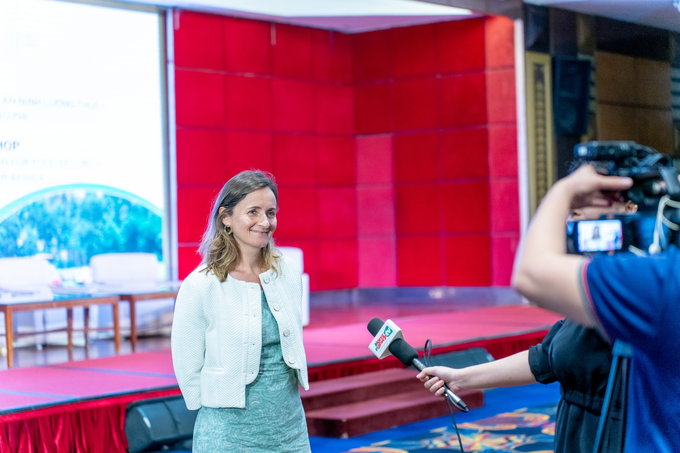
Ms. Marion Chaminade, the Agriculture-Food Counsellor at the French Embassy in Vietnam speaking to Vietnam Agriculture News.
Ms. Marion Chaminade, Agriculture-Food Counsellor, France Embassy in Vietnam shared that Vietnam and France signed a cooperation agreement on agriculture last year.
The agreement was signed by the ambassador on behalf of the French Ministry of Agriculture, together with the Ministry of Agriculture of Vietnam. One of the key points of this agreement is that France would assist Vietnam in South-South cooperation in agriculture, Ms. Marion Chaminade informed.
"The French side has devised a plan in response to MARD's requests and following this agreement. I am delighted to inform you that we will launch a small pilot project this summer." Ms. Marion Chaminade informed Vietnam Agriculture News that this one-year initiative, funded by the French Ministry of Foreign Affairs, will involve France, Vietnam, and Senegal.
The French Agricultural Research Centre for International Development (CIRAD), a French agricultural research agency specializing in tropical agriculture, will serve as the project's implementing agency. The project will concentrate on agroecology and rice cultivation techniques.
The objective is to perform an initial diagnosis to pinpoint the primary obstacles both Vietnam and Senegal encountered. It endeavors to ascertain the areas where collaboration can yield the greatest advantages, utilizing France's expertise. The objective is to capitalize on the advancements in rice production that have been or are currently being implemented in Vietnam to further the development of agroecology in Senegal.
The project "Agroecology in Vietnam and Senegal" outlines several objectives, including the exploration of the potential for scientific cooperation between Senegal and Vietnam in the field of agroecology. This partnership presents a promising opportunity for mutual growth and development. Additionally, the project aims to support Vietnam in its cooperation projects with other southern countries in the fields of agroecology and the development of sustainable practices in rice farming.
It is advantageous for both nations to recognize and capitalize on their contributions to innovation and research. Senegal can substantially improve its agroecological practices by capitalizing on Vietnam's proficiency in developing cost-effective and efficient agricultural models.
Vietnam has made significant progress in developing sustainable and climate-resilient agricultural techniques, according to Ms. Chaminade. These techniques may benefit Senegal as it endeavors to enhance its agricultural sector.
This cooperation can facilitate the exchange of knowledge and the implementation of collaborative initiatives between research institutions in both countries. These initiatives have the potential to promote a more profound comprehension of agroecological practices and encourage the implementation of innovative solutions specifically designed to address the distinctive obstacles encountered in Senegal.
In addition to technical advancements, this partnership has the potential to facilitate the exchange of insights and experiences among researchers and practitioners from both countries through training programs, seminars, and field visits. This collaborative endeavor has the potential to result in the establishment of agricultural systems that are both environmentally sustainable and productive, thereby guaranteeing long-term economic stability and food security for Senegal and Vietnam.
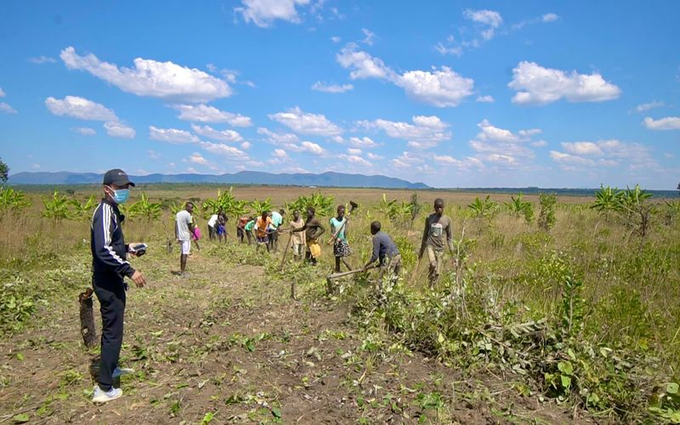
In addition to technical advancements, this partnership has the potential to facilitate the exchange of insights and experiences among researchers and practitioners from both countries through training programs, seminars, and field visits. Author: African Team.
The proposed initiatives to promote collaboration between Senegal and Vietnam in agroecology aim to establish a sustainable and influential partnership. The initial phase comprises diagnosing priority themes and identifying key collaborators. The project can guarantee that stakeholders' efforts are effective and targeted by identifying the most critical focus areas.
Subsequently, it coordinates cross-border missions and a symposium between Vietnam and Senegal. These events will enable the direct exchange of knowledge and interaction between specialists from both countries, enabling them to share innovative techniques and best practices. Establishing a foundation of trust and comprehension is essential for the success of collaborative endeavors, and these cross-missions and workshops are essential for this purpose.
Additionally, the activities would involve developing recommendations for a sustainable agricultural cooperation instrument. This instrument will function as a framework for ongoing and forthcoming initiatives, guaranteeing that all initiatives are consistent with our efficiency and sustainability objectives.
These initiatives will benefit stakeholders in the agricultural cooperation between Vietnam and Senegal, including researchers, educators, and students. Ultimately, the farmers involved in aquaculture and rice cultivation will be the final beneficiaries, as they can directly implement the enhanced technologies and practices developed due to this collaboration.
Gender integration is also a priority in the context of activities. To address the distinctive obstacles encountered by women in agriculture, the initiative will incorporate gender considerations into the stakeholders' needs analysis. Strategies will be devised to encourage women's active participation and leadership in agricultural activities. Furthermore, in order to underscore the significance of gender equality in agricultural development and guarantee that our endeavors contribute to a more inclusive and equitable sector, gender impact studies and awareness activities will be implemented.
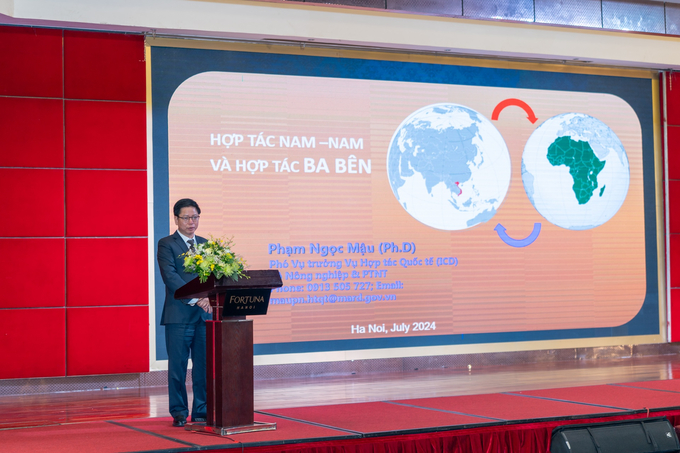
Pham Ngoc Mau, the Deputy Director of the International Cooperation Department (MARD), stated that Vietnam is committed to sharing expertise and ensuring that fostering the agriculture of its African partner countries.
Pham Ngoc Mau, the Deputy Director of the International Cooperation Department (MARD), stated that Vietnam is committed to sharing expertise and ensuring that fostering the agriculture of its African partner countries is successful, easy to implement, and affordable in the future, within the South-South Cooperation framework.
Vietnam has previously provided specialist support to Africa; however, this approach is not conducive to the partners' current agricultural development needs.
Consequently, Vietnam should alter its perspective by converting local agriculture and agricultural techniques that are straightforward and convenient into products that can be exported to other developing countries, including those in Africa.
To guarantee the success of agricultural projects in Africa, the entire project must be managed, from the initial design phase to the post-harvest and harvest phases. This includes the selection of agricultural materials, varieties, and experts.
"As Vietnam's agricultural accomplishments have garnered the attention of numerous countries and increased its popularity." Mau shared that the rice field's added value is not limited to the field of rice harvest, but also includes shrimp and carbon credit - in the future, as well as straws and by-products. Minister Le Minh Hoan previously explained that we must advance agriculture with multiple goals and multiple values.
Translated by Linh Linh

(VAN) The Department of Agriculture in South Africa has announced the country’s first mass vaccination of poultry to prevent local birds from contracting avian influenza.

(VAN) Establishment of the Mekong Delta Regional Agricultural Linkage Center, aiming for a closed value chain, deep processing, trading platforms, and international market connectivity.

(VAN) Gia Lai province has recently recorded 460 rare species of animals and plants, contributing to forest conservation and biodiversity planning in the region.

(VAN) Ms. Caroline Beresford, New Zealand Ambassador to Vietnam, expressed confidence that agricultural cooperation between Vietnam and New Zealand will develop sustainably, be climate-resilient, and promote gender equality.

(VAN) Vietnam reaffirms its commitment to international cooperation in fostering sustainable and responsible fisheries while ensuring resilient livelihoods for small-scale fishing communities.
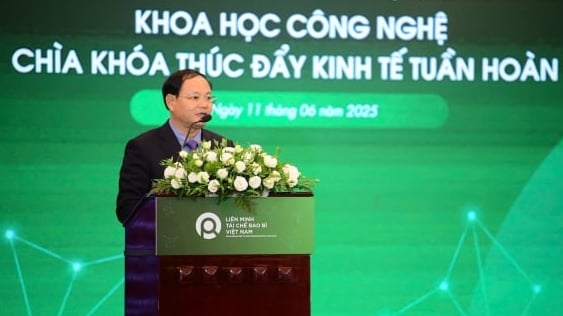
(VAN) More than just a technical solution, science and technology are gradually becoming a cornerstone in Vietnam’s journey toward building a circular economy.
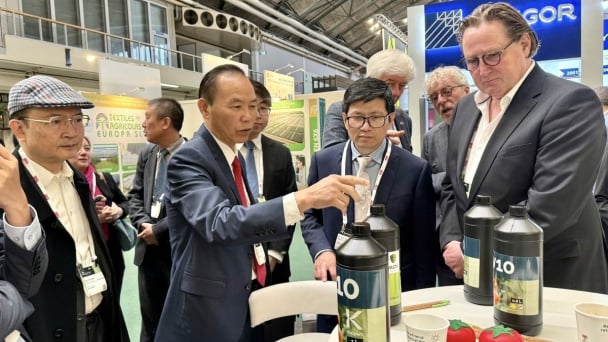
(VAN) The Netherlands is ready to accompany Vietnam in building a green, circular, and sustainable agriculture sector that is resilient to climate change.